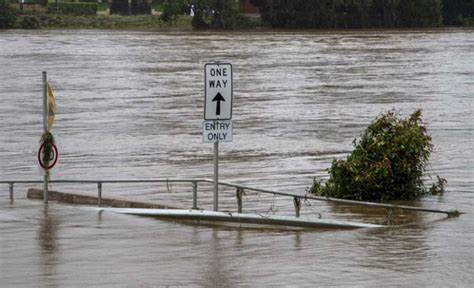Less than two years after bushfires blazed across Australia, the country's east coast is seeing its worst flooding in decades. Some areas accumulated over a yard of rainfall since downpours started last Thursday. Tens of thousands have been ordered to evacuate. On Sunday alone, 500 gigaliters of water, the same volume of water in Sydney Harbor — spilled out of Sydney's largest dam. Even as rain subsides, the floodwater will still pose trouble for weeks to come. We're joined now by Laura Chung, who has been reporting on all of this for the Sydney Morning Herald.
Welcome.
LAURA CHUNG: Thank you for having me.
CHANG: Thank you for being with us. So what are you hearing from people on the ground there? Can you talk about the scope of the damage that they've seen so far?
CHUNG: Of course. So unlike the bushfires, we don't actually have a clear image of how much has just been damaged and destroyed. We know it's a significant part of the state. But what we do know is there has been water everywhere. We've heard and seen houses just being picked up and floating down rivers that used to be farms and paddocks. We've heard of livestock just being completely washed away. There are videos of cows and horses just trying to make it through these really heavy floodwaters. And what used to be streets and paddocks are just now, yeah, completely flooded with water right up to where the power lines are.
CHANG: Wow.
CHUNG: So if you can imagine that, it is a very striking image.
CHANG: What about people who didn't or weren't able to evacuate and are now stranded? I mean, how are rescue operations going right now?
CHUNG: For a lot of people who live in these low-lying plains, floods aren't anything new to them. They've lived with them before. They know how to prepare for them. But there are a lot of people who were just not quite ready for how quickly the water would come up. So we've got thousands of volunteers from the State Emergency Service who are out there along with police and interstate help as well, who are rescuing people in boats. We've also seen helicopters being deployed to try and airlift people out of certain areas. And you know, not only are volunteers having to deal with the really intense flooding conditions. They're also having to deal with the wildlife that's coming their way as well. So there's this story of these volunteers who were rescuing this family, trekking over several kilometers to get to the family. And as they're returning, they got a message over the radio that they have to be aware of snakes. And they reported snakes kind of shimmying up the side of the boat and taking refuge with them just to...
CHANG: Oh, goodness.
CHUNG: ...Get out of that floodwater.

CHANG: Well, Laura, we spoke to you back in December 2019 when the bushfires were spreading across the area. And I'm curious — how do you think recovery from that disaster has affected recovery from this disaster? I mean, we're talking about communities that were just starting to rebuild, right?
CHUNG: Exactly. And they've gone through the bushfires and then — last year — and then immediately after that, there was a first round of floods, and then they were hit by the pandemic and now these floods again. So it's just been crisis after crisis and compounding their loss. Now, one farmer I spoke to had gone through, you know, all these crises. And he said, you know, what the fires didn't take, the floods have taken. And this sentiment has been repeated to me by so many people in that they've already suffered so many losses that this time around, they don't really have anything else to lose. There is this sense of, what next? You know, it's just hit us again and again and again.
CHANG: Well, I understand that much of the rain has dissipated now. Can I just ask you, what is it like to finally see some blue skies and some sunshine where you are right now?
CHUNG: It is a very welcome sight (laughter) — a very strange sight after about seven days of rain.
CHANG: Yeah.
CHUNG: But I think the message that we've constantly heard is the danger is not over. For many people, the flood and the cleanup has only just started. And many residents are saying, well, yes, while we've survived the floods, we've got months of trying to get our lives back on track.
CHANG: Laura Chung of the Sydney Morning Herald, thank you so much for your reporting. And stay safe.
CHUNG: Thank you for having me.












